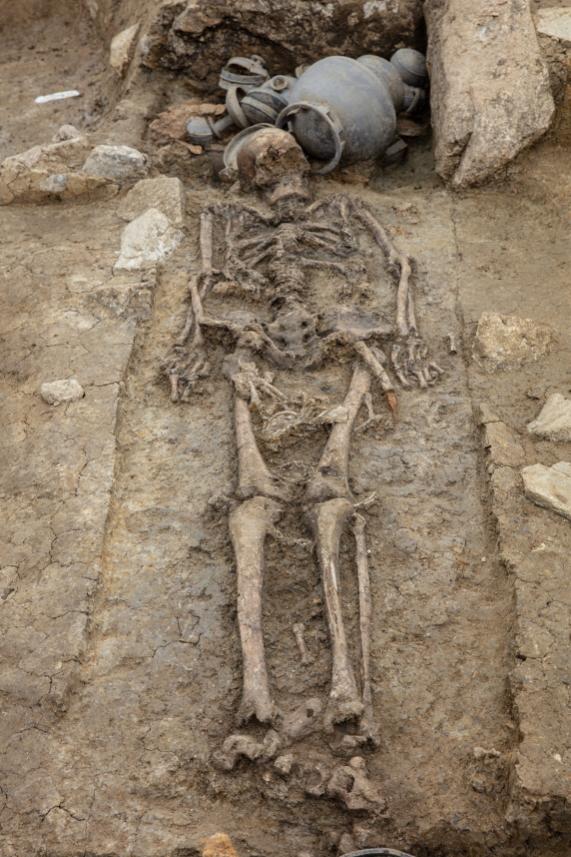- 180cm에 척추 변형된 남성 등 12기의 인골 나와 7.15. 오전 11시 현장설명회 -
문화재청(청장 김현모)이 복권위원회 복권기금으로 추진하는 국비지원 발굴 ‘탑동유적’ 현장에서 지금까지 확인된 삼국 시대 인골 중 최장신에 해당하는 180cm의 남성 인골이 확인되었다. 해당 유적은 한국문화재재단(이사장 최영창)이 조사 중인 경주 탑동 28-1번지(이하 ‘탑동 유적’)으로, 최근 이곳에서 5~6세기 삼국 시대 대표적인 무덤 24기와 그 내부에 있던 총 12기의 인골을 확인했다. 한국문화재재단은 15일 오전 11시 경주 탑동일원에서 일반인들을 대상으로 현장설명회를 진행한다.
* 탑동유적: 경주 남천과 인접한 도당산 아래쪽에 위치. 기원후 1세기 전후 목관묘를 비롯, 6세기까지 무덤이 조영된 것으로 알려져 있는 신라의 중요한 무덤군. 한국문화재재단에서 2010~2021년까지의 조사를 통해 돌무지덧널무덤 130기를 비롯한 약 180여기의 무덤 확인
이번 조사결과 주목되는 것은 2호 덧널무덤에서 확인된 180cm에 가까운 신장의 남성 인골이다. 이는 지금까지 삼국시대 무덤에서 조사된 남성 인골의 평균 신장 165cm를 훨씬 넘는 것으로, 현재까지 확인된 삼국시대 피장자 중 최장신이다. 보존상태 역시 거의 완벽하다.
뿐만 아니라 조사 현장에서 긴급히 이루어진 형질인류학적 조사를 통해, 해당 피장자가 척추 변형(비정상적인 척추 만곡)을 가지고 있었음이 확인되어 눈길을 끈다. 앞으로 정밀한 고고학적 조사와 병리학적 연구를 통해 피장자가 당시 어떠한 육체적 일을 하였는지와 직업군을 추정해 볼 수 있을 것으로 기대된다.
한편, 이번에 공개된 탑동 유적 인골은 국립경주문화재연구소(소장 이종훈)가 수습하여, 한국문화재재단과 함께 다양한 학제간 융복합 연구를 추진하기로 했다.
국립경주문화재연구소는 탑동 유적 발굴조사 과정에서부터 전문 연구자를 통한 정밀한 인골 노출과 기록, 수습ㆍ분석을 지원하고 있으며, 앞으로 인골을 통한 형질인류학적·병리학적 연구를 계획 중이다. 신라인의 생활·환경과 장례풍습을 규명하고, 나아가 안면 복원을 통한 신라 남성의 얼굴을 찾아 신라인의 모습도 보다 구체화할 수 있을 것으로 기대된다.
참고로, 고인골은 과거를 살았던 사람들의 유전학적ㆍ생물학적 특징 뿐 아니라 당시의 생활ㆍ환경을 복원할 수 있는 중요한 자료로 평가된다. 21대 국회에서는 고인골과 같은 출토자료에 관한 제도적 정비를 마련하는 입법이 추진 중이며, 이러한 제도가 과거를 보다 입체적으로 복원하는데 도움이 되기를 기대한다.
Discovery of the tallest buried man from the Three Kingdoms Era at Tapdong, Gyeongju
- On-site briefing about twelve human skeletons including 180cm tall man with spinal deformity on July 15th at 11 a.m. -
The National Research Institute of Cultural Heritage (Kim Hyeonmo, Administrator) discovered a 180cm tall male human skeleton, the tallest among discovered bones of the Three Kingdoms period so far, at the ‘Tapdong site’. The Tapdong site excavation is a project which is funded nationally by the Korea Lottery Commission. The site is located at 28-1Tapdong in Gyeongju and is excavated by the Korea Cultural Heritage Foundation (Choi Yeongchang, Chief director_ KCHF). The KCHF found twenty-four tombs from the Three Kingdoms era between the 5th and 6th centuries and twelve human skeletons inside the tombs. The KCHF will hold an on-site briefing for the public on the 15th at 11 a.m. at Tapdong, Gyeongju.
* Tapdong site: Located at the bottom of Dodangsan Mountain adjacent to Namcheon Stream in Gyeongju. There is an essential group of Silla tombs that are known to be constructed until the 6th century. The KCHF has found 180 tombs including 130 wooden chamber tombs with stone mound through investigation from 2010 to 2021.
What is noteworthy as a result of this investigation is the male human skeleton with a height of nearly 180cm found in wooden chamber tomb no 2. This man is much higher than the average height for male bones (165cm) found in tombs from the Three Kingdoms era so far and this is the tallest among the human bones unearthed at tombs from that era. Moreover, their preservation is almost perfect.
Furthermore, it is identified that the buried person had a spinal deformity (curvature of the spine) through an urgent physical anthropological investigation. In the future, it is expected that it will be possible to estimate what kind of physical work the buried person did and the occupational group through detailed archaeological and pathological studies.
On the other hand, the human bones of the Tapdong site revealed this time were unearthed by the Gyeongju National Research Institute of Cultural Heritage (Jong-hoon Lee, Director _GNRICH) and various interdisciplinary convergence studies will be carried out together with the KCHF. The GNRICH supports precise human bone exposure, record, excavation, and analysis through specialized researchers from the investigation of the Tapdong site, and plans to conduct anthropological and pathological research using human bones in the future. It is expected that it will be possible to clarify the life, environment, and funeral customs of the Silla Dynasty. Furthermore, it is also expected to embody the appearance of the Silla people by finding the face of this Silla male through facial restoration.
In addition, these ancient human bones are evaluated as essential data that can restore the living and environment of the past as well as the genetic and biological characteristics of the people in the past. In the 21st National Assembly, legislation is underway to prepare institutional maintenance on excavated remains including these human bones and it is hoped that this system will help restore the past in three-dimensional ways.

<발굴 당시 피장자 모습>  이 보도자료와 관련하여 더 자세한 내용 설명이나 취재를 원하시면 발굴제도과 오명석 서기관(☎042-481-4947) / 국립경주문화재연구소 박성진 연구관(☎054-777-8805)에게 연락해 주시기 바랍니다. |



